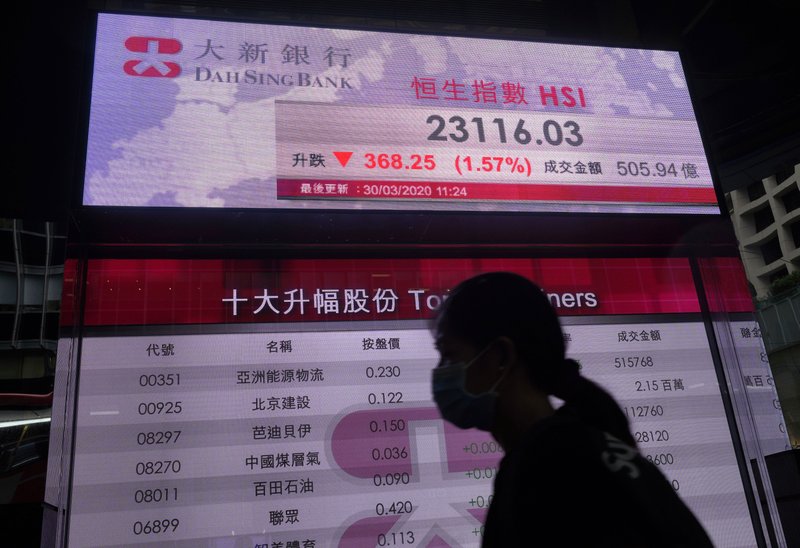NEW YORK -- U.S. stocks climbed Monday, led by big gains for health care companies announcing developments that could aid in the coronavirus outbreak.
The rally tacked more gains onto a recent upswing for the market, which is coming off the best week for the S&P 500 in 11 years. Nascent optimism is budding, but markets around the world are still tentative as global authorities try to nurse the economy through the pandemic. The S&P 500 remains 22.4% below its record set last month, and oil tumbled to an 18-year low.
The S&P 500 rose 85.18 points, or 3.35%, to 2,626.65 on Monday, its fourth gain in the past five trading sessions. The Dow Jones Industrial Average gained 690.70, or 3.2%, to 22,327.48, and the Nasdaq rose 271.77, or 3.6%, to 7,774.15.
European indexes climbed after erasing earlier losses. Asian markets were down, but by much milder degrees than the huge swings that have rocked investors over the past six weeks.
[CORONAVIRUS: Click here for our complete coverage » arkansasonline.com/coronavirus]
A surge for health care stocks led the way at the week's open. Johnson & Johnson leaped 8% after saying it expects to begin human clinical studies on a vaccine candidate for covid-19 by September. Abbott Laboratories jumped 6.4% after saying it has a test that can detect the new coronavirus in as little as five minutes.
Stocks jumped last week after the Federal Reserve promised to buy as many Treasurys as it takes to get lending markets running smoothly and Capitol Hill reached a deal on a $2.2 trillion rescue package for the economy.
"The market wants to see everything line up, and last week everything lined up," said Nela Richardson, investment strategist at Edward Jones, referring to the unprecedented aid from the Fed and Congress.
Now, she said, President Donald Trump also appears to be in sync with health experts about the need to restrict the economy to slow the spread of the virus. Trump on Sunday extended social-distancing guidelines, which recommend against group gatherings larger than 10, through the end of April. Earlier, he had said he wanted the economy open by Easter.
"Now that message is in line," said Richardson. "All these things line up coming into this week, and that's why you saw strong performance last week continuing today."
Some of Monday's sharpest action was in the oil market, where benchmark U.S. crude fell 6.6% to $20.09 a barrel after touching its lowest price since 2002, even after Trump spoke with Russia's Vladimir Putin about falling oil prices.
Oil started the year above $60 and has plunged on expectations that a weakened economy will burn less fuel. The world is awash in oil, meanwhile, as producers continue to pull more of it out of the ground.
In a sign of increased caution, the yield on the 10-year Treasury fell to 0.70% from 0.74% late Friday.
"We have to look at this rally suspiciously," said Sam Stovall, chief investment strategist for CFRA. He pointed to previous bear markets where stocks rallied more than 20% only to fall to new lows. A bear market is usually defined as a long-term decline of more than 20% for an investment.
"Granted, this bear is like no other," he said. "There are too many uncertainties out there for the market masses to have concluded that March 23 was the ultimate bottom."
Still, the 17.4% surge for stocks since March 23 has the first hints of optimism appearing.
Forced selling by investors needing to raise cash is easing, according to Morgan Stanley strategists. They say another pullback in stocks is likely, but current levels offer some buying points for investors willing to wait six to 12 months.
"Our base case is that the lows are in for this bear market for most stocks," they wrote in a report.
Economists expect a number of weak reports on the economy to come in through the week.
The lowlight will likely be Friday's jobs report, where economists expect numbers from March to show the steepest drop in the nation's payrolls since the recession.
The novel coronavirus outbreak sent jobless claims soaring to a record 3.3 million last week as companies large and small began reducing staff as business dried up from closed or curtailed operations. But layoffs are still growing, including among white-collar workers.
"This is the week in which the rubber meets the road," said Stovall at CFRA. "The March employment report, along with the purchasing managers' reports, will help formalize the severity of the economic shutdown."
Most people who contract covid-19 have mild or moderate symptoms, which can include fever and cough. But for others, especially older adults and people with existing health problems, the virus can cause pneumonia and require hospitalization.
The greatest indicator of the start of market stability, analysts said, will be evidence that officials have control over the spread of the virus that's caused life to screech to a halt. If leaders can "flatten the curve" of new infections -- that is, spread them out over time to keep health resources from being overrun -- the U-shaped curve of the economic slowdown will flatten out, too.
The stimulus package plus the Fed's unprecedented intervention to backstop lending markets by purchasing unlimited amounts of U.S. Treasurys and mortgage-backed securities aim to do just that.
Information for this article was contributed by Stan Choe and Alex Veiga of The Associated Press, by Todd White and Vildana Hajric of Bloomberg News, and by Jacob Bogage and Thomas Heath of The Washington Post.
Business on 03/31/2020
